|
Additional Lessons |
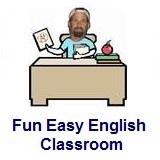 About These
Lessons About These
Lessons
The following classroom lessons are great for students
who want additional listening and reading practice. |
-
Travel America -
Beginner
Level. Do you love America and American
English? Learn before you travel. Facts and other
cool stuff about your favorite U.S. state. Great
English reading practice.
|
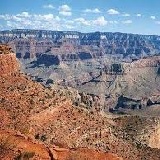 Travel
America - Illinois Travel
America - Illinois
(Beginner -
Reading)
Learn some interesting facts and read interesting
stories about Illinois. |
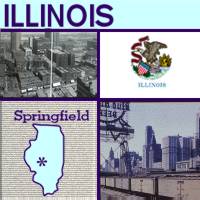 Illinois Illinois
Named for the Illinois Indians, Illinois became the
21st state in 1818. Its capital is Springfield,
which is the home of the Abraham Lincoln
Presidential Library and Museum. |
Illinois
State Flag
The first Illinois state flag was officially adopted
in 1915, a result of the efforts of Mrs. Ella Park Lawrence
and the Daughters of the American Revolution. Miss Lucy
Derwent's design was selected from among 35 entries
submitted by chapters of the D.A.R.
The Illinois flag features the central image of the state
seal on a field of white (the Illinois seal features an
eagle holding a banner in its beak with the state motto
written on it; “State Sovereignty, National Union”). The
current version of the Illinois state seal was authorized in
1867. August 26, 1818, is the date that the first Illinois
Constitution was signed.
In 1969 the current flag design was approved (the word
"ILLINOIS" was added, as well as the sun on Lake Michigan's
horizon in the background). |
|
Source:
State Symbols USA |
|
|
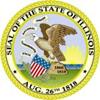 Illinois
State Facts Illinois
State Facts
Picture: state seal of Illinois |
|
State Capital |
Springfield |
|
Nickname |
Land of Lincoln / Prairie State |
|
Motto |
State sovereignty, national union. |
|
Statehood |
December 3, 1818 (21st) |
|
Origin of Name |
French version of an Algonquin Indian for "warriors" |
|
Largest Cities |
Chicago, Rockford, Aurora, Springfield, Peoria |
|
Border States |
Indiana, Iowa, Michigan, Kentucky, Missouri,
Wisconsin |
|
Area |
55,593 sq. mi.; 24th largest |
|
State Bird |
Cardinal |
|
State Flower |
Native Violet (viola) |
|
State Tree |
White Oak (quercus alba) |
|
State Song |
Illinois |
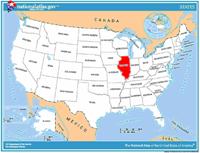 Travel and tourism
site for Illinois - This state travel and territorial
tourism site provides ideas for your vacations, meetings, and more. Travel and tourism
site for Illinois - This state travel and territorial
tourism site provides ideas for your vacations, meetings, and more. |
|
|
Illinois Stories |
|
|
Chicago Botanic Garden
When you think of big urban centers like New York City, Washington,
D.C., or Chicago you probably don't think of gardens. But each of
these cities has a wonderful botanic garden amid their skyscrapers
and monuments.
In 1972, the Chicago Botanic Garden opened to teach lessons of
nature that can be applied to our own lives. The garden is actually
made up of 23 different gardens that visitors may walk through,
including the English Walled Garden, the Midwestern Prairie, the
Circle Garden, an Educational Greenhouse, a Fruit and Vegetable
Garden, a Rose Garden and a Japanese Garden.
The Children's Garden, which was formed when the Botanic Garden
opened, offers Chicago schoolchildren the opportunity to try
planting, weeding and harvesting. In the Endangered Species Garden
visitors can see native plants that are threatened with extinction.
There is plenty of wildlife in the gardens as well. There have been
sightings of bats, deer, woodchucks, bullfrogs and snapping turtles.
There is even a "Big Bugs" exhibit. |
|
|
Early Movies in Chicago
Did you know that before the movie industry moved to Hollywood it
had its beginnings in New York City and Chicago, Illinois? If the
"windy city" of Chicago seems like an odd place to make movies, (or
motion pictures, as they were commonly called), it actually made a
lot of sense at the time. The reason the film industry started in
these cities is because there were plenty of trained professionals
(acrobats, dancers, actors, and stagehands) from vaudeville, the
performing arts theater that was popular at the turn of the century.
The types of vaudeville acts that worked the best for early films
were called "dumb" acts. In this film, a baboon "plays" a violin, a
dog jumps rope and a donkey plays at biting and kicking two men. Can
you guess why they were called "dumb" acts?
Early films were both short and silent, so "dumb" acts were
acrobatic or animal acts that were entertaining without any dialogue
or sound effects. "Dumb" acts were usually at the beginning or end
of a vaudeville show, when people were filing in or out of the
theater and noise did not prevent others from enjoying the
performance. The film on the previous page as well as the film on
this one are typical of the kinds of early films produced in Chicago
in the early 1900s. |
|
|
Sears Catalog Homes
You probably receive many catalogs in the mail selling all types of
things. But have you ever seen a catalog that sells houses?
Between 1908 and 1940, as many as 100,000 Americans bought their
house from a Sears catalog! The houses would be shipped by railroad
and would include about 30,000 parts - not counting the nails and
screws. All of the major parts were there; the main thing you had to
supply was the lot on which to build.
The tagline on the Sears catalog was "Sears...the selling of a
dream." The great American dream has always been to be able to own a
home of your own, and Sears made houses affordable to many people.
In 1908, Model Number 107 sold for between $107 and $650, depending
on the options chosen. Can you imagine being able to buy a home for
only $107? In addition to saving money on materials, it is estimated
that building a Sears house took only about 350 hours of carpenter
labor, compared with 580 hours for a conventional house.
Many of these mail order houses were built in Downers Grove,
Illinois. Today, historians of architecture study these homes, many
of which have been unaltered since they were first built. |
|
|
Glen Ellyn Children's Chorus
Do you think you need to have special musical training to make a
record? You don't if you are a member of the Glen Ellyn Children's
Chorus. A chorus is a group of singers who perform together.
Founded in 1964, the Glen Ellyn Children's Chorus is an
internationally known organization that provides any interested
child with a fun choral music experience, regardless of musical
background. For many of the children, the chorus is an opportunity
to learn how to do something well. As one singer said, "Once, when
we sang this really great concert, I knew it was the best thing I'd
ever done." Here's what some of the other singers have said: "Chorus
is the most special thing I do." "Chorus has shown me what it is to
be excellent -- to do my best."
About 1,300 children in the Chicago area belong to the Glen Ellyn
Children's Chorus, which has made several CDs, such as From Bach to
Bebop, which features the music of J.S. Bach (1685-1750) and jazz
legend Ella Fitzgerald (1917-1996). The Chorus's programs have
served as models for similar groups in the United States since 1964. |
|
|
Pride in Diversity: The Many Voices of the
9th District
How many ethnic groups can you name that are represented in your
community? If your community is like much of the rest of the
country, there are probably several. The United States is often
referred to as a "melting pot" -- a place where people of many
different ethnic groups and faiths live together. Because of this
mix of people, the country is a more interesting than it would be if
everyone were the same.
The 9th Congressional District of Illinois, part of which is in
Chicago, is one of the most ethnically varied, or diverse,
congressional districts in the country, with Russian, Indian,
Polish, Pakistani, Latino, Haitian, and Cambodian people, among
others. There is also a lot of religious diversity, with Jews,
Muslims, and Christians all living together in their communities.
Many festivals in the 9th District celebrate "Pride in Diversity"
and honor the differences between people and what makes us unique as
a country. |
|
|
Naper Settlement
Ever wonder what it was like to go to school in the 1800s? Well, if
you want to travel back in time, all you have to do is go about 30
miles west of Chicago to Naper Settlement. There you will find an
outdoor historic village that re-creates 19th century life.
Take a stroll down the road and you'll see Copenhagen Schoolhouse.
Usually built as close to the center of town as possible,
schoolhouses often served as the town's social center as well. Farm
children from first grade through high school sat at desks in this
one-room school and learned their lessons. In addition to all being
in one room, all the students shared one teacher.
The teachers were expected to teach reading, writing and spelling;
then, they could teach a variety of other subjects as they chose,
including geography, history, moral values, manners, truth, and love
of country. Lessons were taught mostly through memorization drills
and spelling bees.
Would you like to have been in school during this time period? |
|
Source:
Library of Congress |
|
 National
Forests and Monuments of Illinois National
Forests and Monuments of Illinois
The following is a description of national
forests and monuments in the state
of Illinois. There are no national parks in
this state. If you plan to visit or live in
Illinois for awhile then you should
definitely plan to visit some of these
fantastic places. |
|
|
|
National Forests |
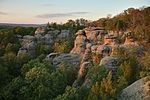 Shawnee Shawnee
As Illinois's only National Forest, Shawnee
is located in the southern part of the state
and contains seven wilderness areas,
including the Garden of the Gods. Among the
many miles of hiking trails in the forest is
the River to River Trail, which is 160 mi
(260 km) long. |
|
|
|
National Monuments |
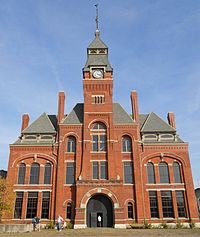 Pullman Pullman
Built for the Pullman Company, it was the
first planned industrial community in the
United States and the site of the 1894
Pullman Strike. |
|
|
|
 Travel
America Travel
America
Do you love America and American English? Learn before
you travel. Facts and other cool stuff about your
favorite U.S. state. Visit the Fun Easy English Travel
America pages. Read about the beautiful National
Forests, Parks, and Monuments. Great English reading practice. |
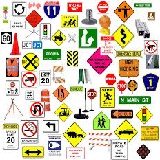 Drive America Drive America
Planning to drive in America? Learn the rules and
regulations. Great English reading practice. |
|